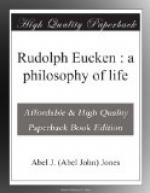Idealism, too, seems to be a mere compromise between religion and a life devoted to sense experience, and like most compromises it lacks the enthusing power of the original ideas.
Finally, the whole theory leaves us in uncertainty—“that which was intended to give a firm support, and to point out a clear course to our life, has itself become a difficult problem.”
But Eucken has more to say concerning idealism, even though in a different form from the theories of the past. Indeed, his philosophy is generally classed amongst the idealisms. Eucken makes a great endeavour, however, to avoid the difficulties and objections to the idealistic position; later we shall see that a great measure of success has crowned his efforts.
Having discussed the two solutions that place special stress on the invisible world, he proceeds to deal with the theories which emphasise the relation of the life of man to the material world.
He first treats of Naturalism, that solution of the problem that makes the sense experience of surrounding nature the basis of life, subordinating even the life of the soul to the level of the natural, material world.
Nature in the early ages had been superficially explained, often in the light of religious doctrine. Man gave to nature a variety of explanations and of colouring, depending largely upon his ideas of the place of nature in relation to himself and to the invisible world. But such anthropomorphic explanations could not long survive the progress of the sciences, for a scientific comprehension of nature could only be attained by getting rid of all human colouring, and by investigating nature entirely by itself, out of all relation to the human soul. Man then investigated nature more and more as an object apart from himself.
The first result of these investigations was to impress upon him the reality of nature as something independent, and to increase on a very large scale his knowledge of, and control over nature. When man began to formulate and understand nature, he began, too, to invent machines to profit from the knowledge he gained. Hence followed a marvellously fruitful period of human activity, an activity which at first strengthened man in his own soul, and gave him increased consciousness of independence and power. While he was compelled to admit the greatness of the natural world, he became more and more convinced that he himself was far greater, for could he not put the laws of nature to his own use and profit? Hence the gain to man at this stage of the development of the sciences was very great, for he had come to appreciate more than before the superiority of the human soul over the material world. Hence resulted a more robust type of life, “a life energetic, masculine, pressing forward unceasingly.” Matters, however, were not destined to remain long at this stage. As man’s knowledge of the processes of nature increased further, a twofold result followed. On the one hand, the sense world of nature became increasingly absorbing in interest; on the other hand, laws were formulated and nature was conceived of as being a chain of cause and effect, a combination of mechanical elements whose interactions were according to law, and could be foretold with the utmost precision.




